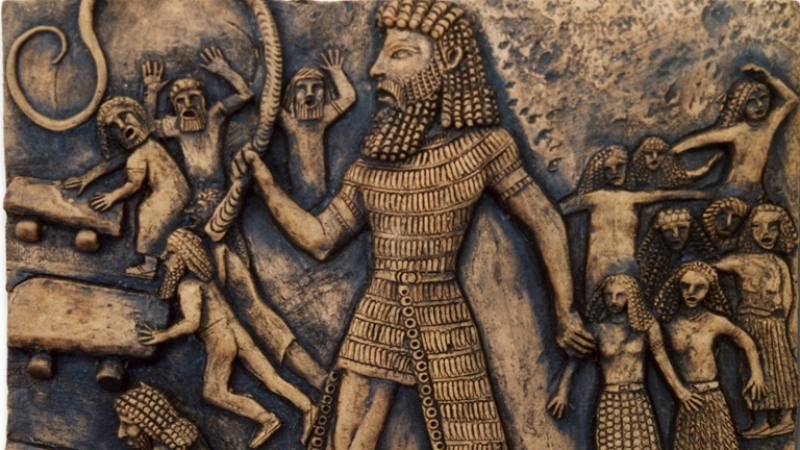Imagine grasping eternal life in your hands just to watch it disappear before your eyes. Or imagine that the hardest journey of your life is finally over and you have failed to obtain the very thing you wanted most. Our story begins in a land known as Mesopotamia about four thousand years ago. There one of the earliest cities in history existed, called Uruk, which lies on the Euphrates river near the Persian Gulf. This city became famous for being the site of one of the earliest piece of literature ever created, The Epic of Gilgamesh. Although in this story Gilgamesh, the hero, is the king of Uruk, he is also partly a god. He is one part mortal and two parts divine, and as such, he was a being full of beauty and courage, but also as terrifying as a wild bull.1 The Epic of Gilgamesh is an adventure story with many exciting parts. However, one of the central themes of the epic revolves around Gilgamesh’s search for immortality.2

Gilgamesh’s quest for everlasting life begins when his friend Enkidu unexpectedly dies. The trauma from losing his dear friend scares Gilgamesh. Enkidu isn’t just a dear friend to Gilgamesh, Enkidu is like a brother to him. The gods had originally created Enkidu to help stop Gilgamesh from stirring up trouble, but after they met, they got along so well that they became brothers and went on countless journeys together. With Enkidu’s death, Gilgamesh is so terrified by the idea of death that he goes on a long journey to beat the inevitable. On this journey he meets several people who tell him that his journey is pointless and that he won’t find what he is searching for. But Gilgamesh doesn’t listen, and pushes forward regardless of what people say. He is so determined to find Utnapishtim, the only human who had been made immortal, but doing so he ignores what his body really desires, sleep. He completely exhausted himself to the point where he was near dying.
After a long and dangerous journey, Gilgamesh finally meets Utnapishtim, who tells Gilgamesh, “There is no permanence. Do we build a house to stand forever, do we seal a contract to hold for all time?…. When the Anunnaki, the judges, come together, and Mammetun the mother of destinies, together they decree the fates of men. Life and death they allot but the day of death they do not disclose.”3 Even with the wise information that Utnapishtim tells him, Gilgamesh is still in pursuit of immortality, so Utnapishtim decides to put him up to a test. The test requires him to stay awake for six days and seven nights, but Gilgamesh ultimately fails the test. Utnapishtim had a kind heart and told him that, instead of obtaining immortality, he might obtain youthfulness. There was a plant in the sea that can restore one’s youth. So of course Gilgamesh doesn’t hesitate in jumping in to find this plant. He finally gets the key to youthfulness, and decides to rest and relax, because he believes his troubles are over. With his guard down, a snake snatches the plant away from him and the plant is gone forever.
Gilgamesh finally accepts this fate, and goes back to the land of Uruk. Although he never got immortality, he did get what he needed. Throughout the story the same line recurs about what is he suppose to do after Enkidu’s death, which is just to live his normal, mortal life.4 Once he returns, he writes on a wall the story of his long journey for immortality. The world may never know if there was a real living, breathing ruler named Gilgamesh, but at least for now we have a legendary one that will last forever.
- Jerry Bentley, Herbert Ziegler, and Heather Streets Salter, Traditions & Encounters: A Brief Global History Volume 1. 4th edition (New York: McGraw Hill, 2015), 5. ↵
- Tzvi Abusch, “The Development and Meaning of the Epic of Gilgamesh: An Interpretive Essay,” Journal of the American Oriental Society 121, no. 4 (2001): 614. ↵
- Nancy K. Sanders, The epic of Gilgamesh (Harmondsworth, Middlesex: Penguin Books, 1964), 23. ↵
- Nicola Vulpe, “Irony and the Unity of the Gilgamesh Epic,” Journal of Near Eastern Studies 53, no. 4 (1994): 280. ↵



93 comments
Kendall Guajardo
This story of Gilgamesh really reminded me of one of my favorite books called “The Alchemist.” Even though the journey was different there was the same general underlying theme of pursuing something more. I really loved this article and its story. Knowing that it was one of the first pieces of recorded literature just makes it that much more amazing. Any story that follows the search for purpose after death surely is something many people can relate to. The unforeseeable future is what makes his pursuit so exciting. It is saddening that he never found the closure he thought he needed but the journey is probably what made him accept his fate by trying.
David Castaneda Picon
This was my first time reading Gilgamesh, I have never read the complete story of “The epic Gilgamesh” but it sound very interesting and I might read it. It was sad for me that he never got to be immortal despite all the effort and sacrifices he did along his journey. I really liked reading this article and I wonder what would happen if he would have gotten eternal life or at least the plant for youthfulness.
Melissa Garza
After reading this article I really wanna read more about the topic in The Epic of Gilgamesh! For the longest time I have always been afraid of death because I really don’t know what comes after. To read about Gilgamesh and his quest for immortality is really interesting. I found it really interesting that the task was to stay up for seven days because while doing research on the Cherokee myth of creation, I found the animals were told to stay up for seven days and the ones that did were granted with the ability to see in the dark.
Andres Ruiz
As a person who believes that immortality can be achieved through mechanics, I feel for Gilgamesh. Fear of death is a common fear that I believe almost everyone will have to face in their lifetime. The loss of someone dear is also a thing that we as mortals must confront. Much like Gilgamesh, we ask ourselves what to do after they pass, and the answer is always the same: continue living our life. It warms my heart to see stories such as these from so long ago, as it shows that even our long past ancestors were facing the same problems we were, just without the smartphones.
Meadow Arriaga
Gilgamesh worked hard to gain immortality, but never got it. He was definitely inspired to do so by the loss of his good friend however, he should’ve listened to the people he met. They tried to warn him, so maybe they knew something he didn’t. Overall, I think Gilgamesh deserved to gain immortality. Although he was incapable of completing the tasks, his determination took him a far way.
Francisco Cruzado
I used to read a lot the Epic of Gilgamesh when I was little. I loved pondering on whether the friendship between Enkidu and Gilgamesh was not instead a faint confession and explicit retelling of homosexuality, on how one of the first written expressions of humanity could be exactly a confession of our desire for understanding our mortality, on why is it that Noah’s tale in the bible has so many similarities with certain extracts from the Epic, and on what could have been the influence of this text in the basic foundations of the Christianity that began in Ur, with a mythical man named Abraham. I liked the synthesis given here, it conveys what has to be conveyed: Gilgamesh’s journey toward eternity, both literarily and literally.
Amanda Shoemaker
This is the first time that I’ve ever heard of ‘The Epic of Gilgamesh’. Losing someone close to us is always hard and does make you think more about death and how scary the end is. I can understand why this would cause him to search for infinite life. It’s interesting how the tale has Gilgamesh find a completely different meaning than what he had started out looking for in the beginning. It’s definitely a metaphor for real life because what we are seeking is almost never what we find. I will definitely have to read the full story after reading this article.
Sara Guerrero
I never heard the legend of Gilgamesh I think it was sad that he was traumatized by the death of his dear friend that he has to seek immortality. I wonder if the immortality that he believed in was truly on achieved by death in the afterlife and he was unaware of it. Although, he was granted youthfulness it still wouldn’t fill the sadness within him from losing his friend. Great legend and an interesting read.
Rosa Robledo Martinez
I remember reading the legend of Gilgamesh sometime in high school for an English project. I was really hooked into the topic, because in my perspective it really shows the different types of literature we have opened to us. But not only that it helps many people to see that there is more stories besides the ones we are normally used. Overall a very interesting article.
D'Hannah Duran
I had never heard of the legend of Gilgamesh, it is really interesting to read about the search for eternal life. I really enjoyed this article. I wonder what would have happened if people had access to eternal life and if that was something that could be way worse than it sounds. Death and fear are something that make us human and makes life real, so I don’t think that eternal life would have made anything better.